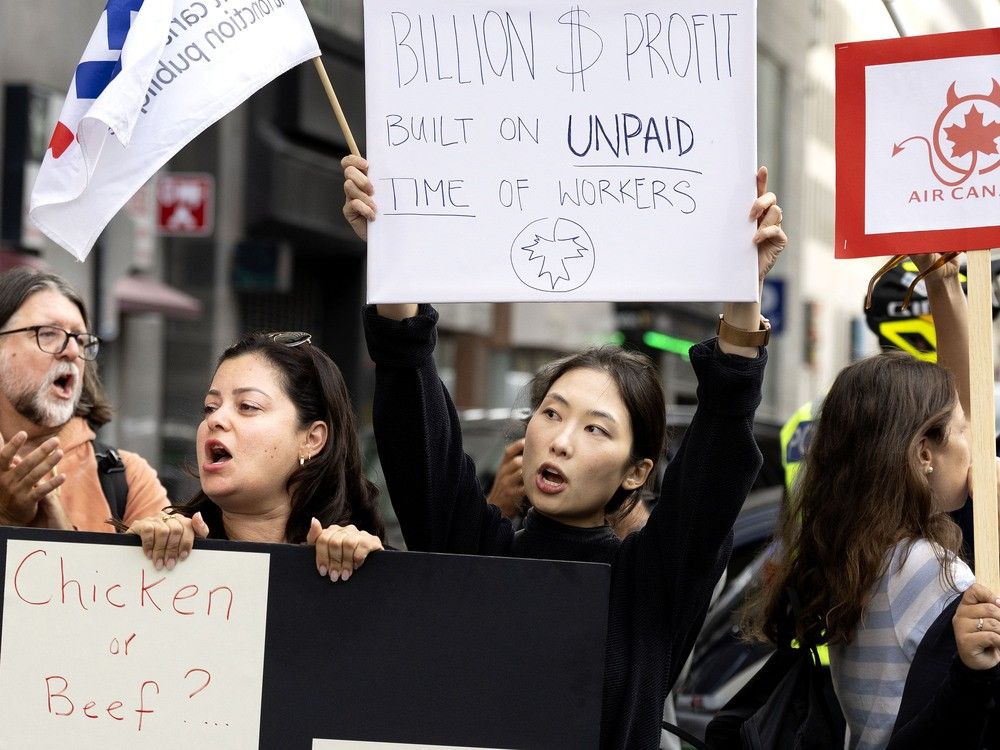
OTTAWA — Air Canada has agreed not to discipline flight attendants who continued to strike illegally on Monday as part of a tentative agreement that would increase base salaries immediately by at least eight per cent and offer pay for ground work, CUPE says.
During a Zoom call with members, leadership of the Air Canada component at the Canadian Union of Public Employees (CUPE) said the four-year tentative agreement struck with the airline after a tumultuous strike weekend was a mixed bag.
Whereas some of the gains made for flight attendants were “monumental,” other aspects of the deal such as wage increases were not what union representatives hoped for, they told hundreds of members during the Tuesday call attended by National Post.
“Did we do the best we could? Yes. It is the best (deal)? No, none of us believe it is,” CUPE Air Canada Component President Wesley Lesosky said.
“Could we have done better? I don’t know, because interest arbitration could have ripped it apart,” he added about looming binding arbitration that was controversially ordered on the parties by Job Minister Patty Hajdu on Saturday.
During the two-hour call, Lesosky explained that almost the entirety of the tentative agreement had been approved by the bargaining team. The only exception was wage increases, which will be put to a 10-day vote to members starting this week.
He said that tentative deal included a 12 per cent salary increase for many Air Canada and all Air Canada Rouge flight attendants this year, followed by annual increases of three per cent, 2.5 per cent and 2.75 per cent by 2028.
But the 2025 pay increase falls to eight per cent for more senior mainline employees who are currently above the ninth pay step in the collective agreement.
“This, your union… feels is not deserving to bring forward to you,” Lesosky said, signalling that’s why it is the only component of the tentative agreement that is being put to a vote.
“We completely feel and have presented and maintained the full way through bargaining that we should be a couple percent at minimum above Air Transat” which is the industry leader, he added.
If members don’t approve of the raises, the issue will go to binding arbitration but the rest of the deal will remain the same, union leadership said.
In an interview on CBC Tuesday morning, Air Canada executive vice-president Mark Nasr described the new working conditions for flight attendants as “industry leading”.
He said the company looked forward to welcoming its 10,000 flight attendants back to work and getting planes back in the air after the strike that grounded hundreds of flights and left hundreds of thousands of Canadians scrambling to find alternative travel.
The tone during the Tuesday union call was largely relief from an exhausted union bargaining team that negotiated the tentative deal into the early morning Tuesday.
Despite concerns about wage increases and a few other issues, Lesosky said that the union had manage to secure “monumental” gains for its members.
The biggest win was on unpaid “ground time,” a major sticking point between both parties. Effective immediately, Lesosky said crew will receive 50 per cent pay for 60 minutes of pre-flight time on narrowbody planes and 70 minutes on widebody jets.
That will increase gradually to 70 per cent by the end of the agreement in 2028.
“That is a huge gain,” Lesosky said, though he promised the union would continue to fight for it to be full pay because the reduced rate is “illogical.”
Union leadership also boasted improvements to some flight staffing, pensions, benefits, pay protection for Air Canada Rouge employees and a host of other gains for members.
The component president also told flight attendants there would be no discipline for having participated in the strike even after it was declared illegal by a federal labour tribunal on Sunday.
“Part of this agreement going forward is that there will be no retribution on any of you for anything you did during picketing or during the strike,” Lesosky said.
“Anyone that feels that they may have held up a bad sign or stormed a press conference or done any of that kind of stuff, you’re protected.”
Final negotiations were done under a sword of Damocles after Jobs Minister Patty Hajdu ordered negotiations go to binding arbitration and flight attendants return to work just hours after the work stoppage began Saturday morning. She also ordered an inquiry into unpaid work at Air Canada.
But CUPE leadership refused to call off the strike this weekend, even after a federal labour board ruled the work stoppage was illegal Monday morning.
By that evening, Air Canada and CUPE were back to the bargaining table. Around 5 a.m. Tuesday morning, they announced they had reached a tentative deal.
Despite the possible agreement, union leadership said the relationship with Air Canada is damaged.
“Labour relations at Air Canada is broken. It is fractured. It’s going to be very hard to come back from, that is the reality,” Lesosky said on the call.
“Labour relations with this employer are almost dead. What they did to us was absolutely horrible, we weren’t expecting that,” Component Secretary-Treasurer Guillaume Leduc added bluntly in French. “Remember that this employer was dishonest with us from the start. I think that they hate us.”
Air Canada did not immediately respond to a request for comment.
National Post
cnardi@postmedia.com
Our website is the place for the latest breaking news, exclusive scoops, longreads and provocative commentary. Please bookmark nationalpost.com and sign up for our politics newsletter, First Reading, here.